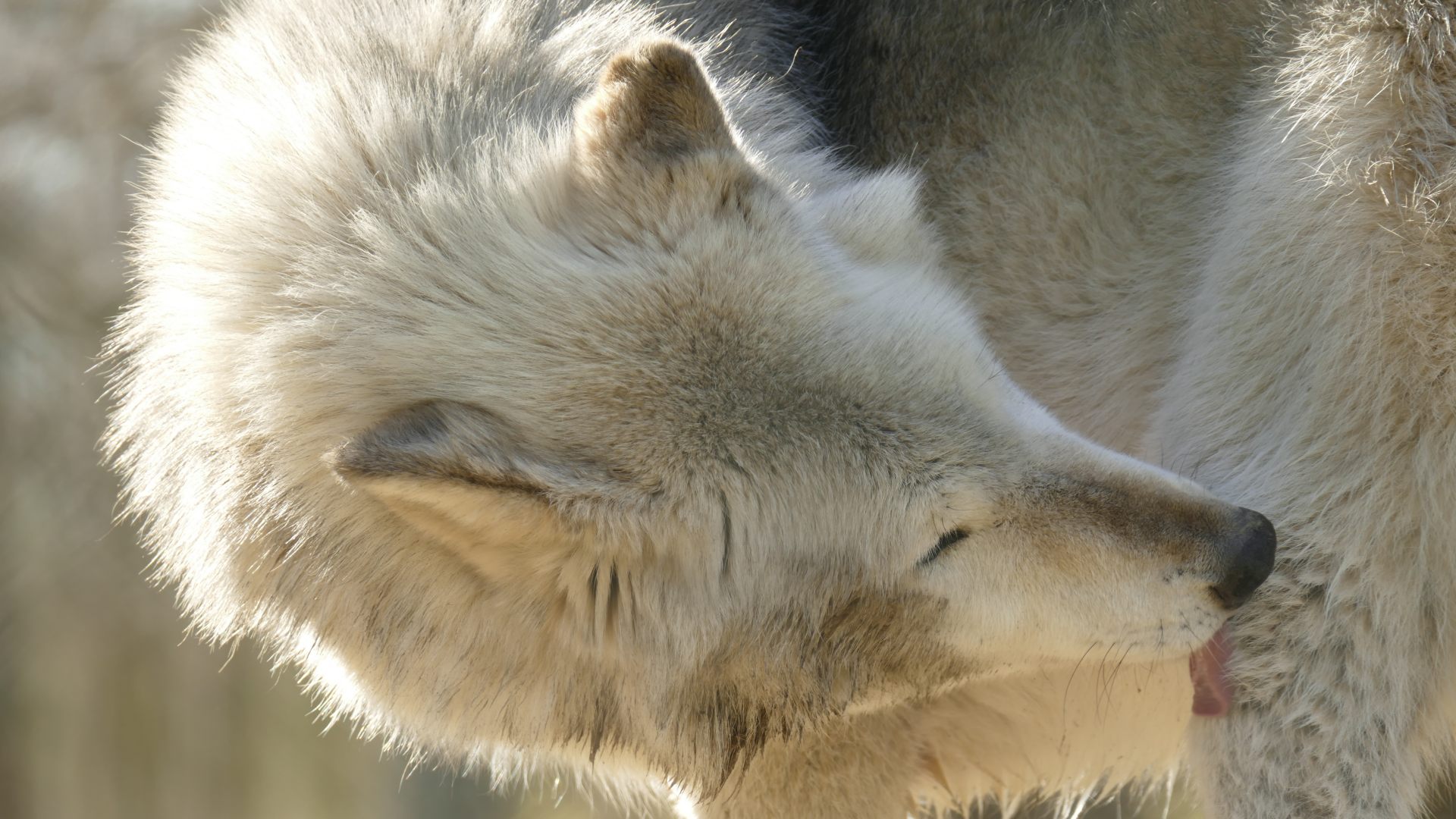
What are the wolves up to?
Further photos and updates are available on the "UKWCT Friends" Facebook group.
(Please note: the group is not an official UKWCT site; opinions and views posted there may differ from those of the UKWCT.)
Previous updates are available:
2024
October and November, April to May
2023
May
2022
Jan-Jun, July
2021
Jul-Dec ,May-Jun ,Mar-Apr ,Jan-Feb
2020
Oct-Dec, September, August, July, June, Mar-May, Feb, Jan
2019
Dec, Nov, Oct, Sep, Aug, Jul, May/Jun, Mar/Apr , Jan/Feb
2018
Nov/Dec 2018 and Sep/Oct 2018

Even though it's only September, the Arctics are growing their magnificent winter coats. We all had a good look at them as we arrived, as the Arctics milled around, curious as ever.
The days at the Trust are shorter now, as we're down to four wolves, but the overall pattern is similar. One big change is that the Beenhams don't come out on walks as often - neither Tala nor Tundra fancied coming out, so instead we went in with them for a while. They've become a bit more wary now that Nuka is no longer part of their pack. The Arctics still come up to the fence for some fuss and attention, and had plenty of both during the day. Our senior handler for the day brought her American Akita - staying outside the enclosures, of course - and he was a hit with the Beenhams: they were fascinated with him!
Feeding is much as it was, with the familiar mix of beef and chicken. Paunch is harder to come by these days as the main abattoir for the region has closed; the frozen supplies we still have are being carefully rationed. The volunteers bring in various extra bits and pieces, so they had their usual tinned fish as an extra, and some dried furry rabbit ears for enrichment. The wolves treated them with curiosity, but soon got the idea and crunched them happily.
The tortoises were cleaned and fed, and our senior handler went into the Arctics' enclosure to give the webcam a much needed wipe down - it now has a pin-sharp image, as it used to.
With all the bits for the day completed, we said our goodbyes and headed for home, another good day at the Trust.


Spring has arrived, and the day dawned bright and frosty. It was to be a wonderful sunny day, with the wolves' coats looking magnificent in the light. We got a good look at those coats, too, as the Beenhams were taken out for a walk. This time Tsa (director of the Trust) joined us for a while, and we set out around the back fields, stopping briefly to make a fuss of the wolves. They were their usual selves, having a good old sniff as we went round and, of course, investigating anything smelly - first sniffing, then pawing, and ultimately rolling. The ground became squelchy as we approached the Bourne, at the bottom of the field, and there were mud deposits from when the stream was running much higher. There were plenty of deer hoofprints, too, and the wolves had a good sniff. Nuka then went into the stream, pawing delightedly at the water - he exuded bonhomie as he looked up at us, soaking wet.
The wolves went into the pond (the water levels being quite high), and again Nuka pawed a bit, sloshing arcs of water into the air. We then meandered around the bottom of the field, the wolves relishing the various new smells since the last time they were out. They were all very relaxed, and it was a far cry from the old days where the wolves became a bit tense due to the breeding season.
Eventually we returned to the enclosure and popped the wolves back inside. There was a short break, during which time the webcam was sorted out - it's back online, and gives a view into the Arctics' enclosure.
It was then feeding time for the wolves, the usual mix of chicken, beef, paunch and sardines. The kites flying overhead thought it was feeding time too, and they swooped low to try and grab some of the wolves' food. This is one of the side effects of feeding the wolves by the fence line, as any food dropped is harder for the kites to reach.
We then went in with the wolves for a bit, with all three Beenhams coming and going, and both Tala and Tundra giving their trademark neck rubs to the volunteers. One of the things we do when we're in the enclosure is examine the wolves for ticks, lumps, etc, and this time Nuka took it as an invitation to play - he suddenly zoomed off at full pelt, galloping off around the mound. It was a reminder of how even coming up to 14 years old, the wolves still have a joie de vivre about them.
The day then came to a close, as we bade farewell to the wolves, gave them a dried lambs' ear each (which prompted much rolling with the Beenhams), and headed off in our separate directions, having had another fun day at the Trust.
















